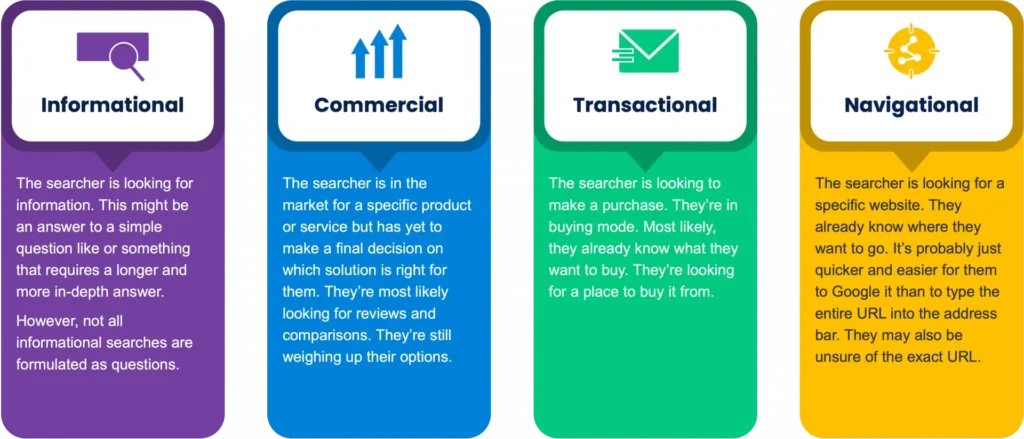What are keywords?
Essential for online visibility
In today’s digital landscape, keywords are the foundation of online visibility. They determine whether your business is found by the right people at the right time.
The right keywords don’t just bring clicks — they attract qualified visitors who are actively searching for your products, services and offerings. Without them, even the best website or content risks staying invisible to your ideal audience.
In this article, I will walk through what keywords are, why they’re essential for online growth, and how strategic keyword research can give your business a competitive edge.
Keywords define your content
But keywords are more than just search terms, they represent the core topics and ideas that define your content. If you were to strip your page down to its most essential elements, the words that remain, the ones repeated in your headings, copy, and even image descriptions, are your primary keywords. These keywords help both search engines and users understand what your page is about.

Choosing the right keywords matters
For SEO to be successful, choosing the right keywords is critical. It’s not just about popular terms; it’s about selecting the ones that align with your content, match user search intent, and offer a realistic chance of ranking. This requires research into how often a keyword is searched (search volume), how competitive it is, and what kind of content already ranks for it.
SEO keywords vs. PPC keywords
In search engine marketing, whether you’re focusing on pay-per-click (PPC) or search engine optimization (SEO), thorough keyword research is the foundation of success. The key is knowing which terms are better suited for long-term SEO growth and which are more effective when used in paid advertising campaigns.
In digital marketing, keywords fall into two main categories:
- SEO keywords: These are terms you optimize for in organic search results. They’re part of your long-term content and ranking strategy, aiming to bring in unpaid traffic.
- PPC keywords: These are used in paid advertising, such as Google Ads, where you bid to appear in sponsored listings for specific search terms.
By analysing the intent behind each keyword, you can more easily determine which ones to target organically and which to pursue with PPC. Understanding what motivates users to type specific queries into search engines helps you decide if investing in those terms is worthwhile.
Why the right keywords are your SEO advantage
As a content creator or website owner, using the right keywords increases your chances of reaching the right people. It ensures your content appears where and when your audience is searching, helping you attract qualified traffic, whether you’re focused on growing a blog, building brand authority, or driving conversions.
Why are keywords important for SEO?
Keywords are the SEO foundation
Keywords are the foundation of effective search engine optimization. Users type words or phrases into search engines like Google when looking for information, services, or products. In essence, keywords reflect how people think and search online and mastering them means learning to speak your audience’s language.
When you create content using keywords that match the terms your audience is searching for, you increase the likelihood of your pages being discovered in search results. This is especially important for organic visibility, where relevance and search intent are central to how well your content ranks.

Keywords as the link between searches and content
Keywords serve as the link between what people are searching for and the content you provide. When chosen and used strategically, keywords help search engines understand your content and match it to users’ search intent, ultimately improving your visibility, attracting more qualified traffic, and increasing your chances of generating leads and conversions.
The role of search intent
At the heart of SEO lies search intent, i.e. what users are looking for when they type a query into Google. Keywords bridge the gap between your audience’s intent and your website’s content. Without them, search engines would struggle to deliver the right pages to the right users.

Why keywords matter
- Visibility: Keywords help your content appear in relevant search results. The right terms make it easier for search engines to categorise and rank your pages, increasing your chances of being found.
- Traffic: Relevant keywords draw in users actively searching for the solutions or information you offer.
- Conversions: Keywords don’t just bring any traffic—they attract visitors who are more likely to engage with your content, subscribe, inquire, or buy.
Keywords as your strategic guide
Think of keywords as your SEO compass. Just as a fisherman wouldn’t cast a line without knowing where the fish are, you shouldn’t create content without knowing what people are searching for.
But it’s not just about sprinkling popular terms into your content. True SEO performance comes from using the right keywords—the ones that balance reasonable search volume with achievable competition. This is where keyword research becomes essential.

What you can discover through keyword research
Keyword research goes beyond just finding popular terms — it reveals valuable insights that can support shaping your entire digital marketing strategy. By analysing search data, you can uncover:
- What your target audience is searching for
- Which keywords are realistic for you to rank for
- How to structure your site and content for search
- Which phrases to use consistently so search engines understand your page’s topic
Ultimately, these discoveries help you create content that resonates with your audience, improves visibility in search results, and positions your business as a trusted authority in your industry.
Keywords influence all aspects of SEO
Keywords guide almost every SEO task: from planning your site’s architecture and organising category pages to crafting blog posts, product descriptions, video titles, and landing pages.
How search engines use keywords
Search engines like Google analyse the words on your page to understand what it’s about. If every word is used equally, none stands out as necessary. That’s why using relevant key phrases throughout your content—naturally and strategically—is vital. It tells both search engines and users that your content meets their needs.
Speak the language of your audience
Good keyword usage is about understanding your audience and speaking their language. If your content uses terms your potential visitors aren’t searching for, you risk missing out on the traffic you’re trying to reach. Your rankings and results improve when your content aligns with search intent.

What is keyword research?
Keyword research is a core SEO strategy
Keyword research is identifying the words and phrases people use when searching for information through search engines like Google. It’s both a foundational and strategic element of SEO, guiding you in creating content that meets your audience’s needs and drives qualified traffic to your site.
The process behind keyword research
At its core, keyword research is a discovery, analysis, and refinement process. It helps you uncover what topics matter to your audience and how competitive those terms are. By understanding search demand and keyword difficulty, SEOs, marketers, and business owners can make informed decisions about which terms to target—balancing opportunity with achievability.

Beyond volume: finding the right fit
This process isn’t just about finding high-volume keywords. It’s about identifying the right terms, those that attract the right people at the right time, with the right intent. When you understand what your audience is searching for, you can align your content accordingly and show up when they need answers. That’s the real magic of SEO.
The role of search intent
Modern keyword research goes deeper than just listing terms. It prioritizes search intent—understanding the why behind a search. Is the user looking to learn, compare, or buy? Organizing keywords by the user journey or sales funnel stages allows you to tailor content that supports your potential customers wherever they are in their decision-making process.
From research to results
When done right and supported by other core SEO tactics like internal linking and content optimization, keyword research enables a consistent, scalable content strategy. It transforms guesswork into actionable direction, helping you create content that performs, ranks, and resonates. In this way, keyword research becomes more than just an SEO task, it’s a powerful tool for connecting with your audience and growing your online visibility over time.

Why keyword research is the real SEO power tool
Think of keywords as your SEO compass. Creating content without understanding what people search for is a shot in the dark. That’s why keyword research is the first step in any solid SEO campaign and why skipping it can mean missing out on traffic and conversions altogether.
When you build your content around keywords that people use, you enable search engines to rank your content higher. This foundational step supports everything from:
- Structuring your site and planning your architecture
- Organising product and category pages
- Writing optimised content for blogs and YouTube
- Fine-tuning landing pages and sales funnels
But keyword research isn’t only about ranking. It’s about understanding your audience, what they care about, what questions they ask, and the language they use. It helps you create content that gets discovered and delivers value.
Search engines read your words – so make them count
Google and other search engines analyse your page’s text to understand its topic. If every word on the page is used equally, the algorithm cannot know what’s important. By consistently using the correct key phrases, you’re signalling to search engines exactly what your content is about.
More importantly, you’re also signalling it to your readers. While rankings matter, the real focus should be on users. If your content doesn’t match how your audience thinks and searches, you risk attracting the wrong traffic, or none at all. Significant keyword usage means tapping into your users’ mindset and clearly reflecting their intent in your content.

Keyword research: beyond search volume
Many assume SEO is about chasing high-volume keywords. In reality, it’s about finding the right ones. Smart keyword research helps you identify your “SEO sweet spot”—the overlap between terms your audience is searching for and those you can realistically rank for. These are the keywords that:
- Aren’t overly competitive
- Allow you to create high-quality, relevant content
- Match your brand’s voice, goals, and audience intent
This clarity allows you to develop content that ranks and performs, turning search visibility into real business impact.
What you gain from doing keyword research right
SEO is a long-term game. While quick wins are possible, long-lasting results depend on laying the proper foundation. Keyword research is that foundation, and here’s what it delivers:
- Market trend insights: Discover what’s relevant right now. Keyword data reveals shifts in interest so that you can create timely, strategic content based on actual demand.
- Traffic growth: Align your content with what people are already searching for. The result? Higher rankings, more clicks, and more opportunities to convert.
- Better customer acquisition: Not all traffic is the right traffic. By targeting search terms aligned with user intent, your content naturally draws in the right visitors, and a strong call to action helps guide them from awareness to action.
By researching keywords for their popularity, search volume, and intent, you’re not just creating content—you’re solving real problems, answering real questions, and building genuine connections with your audience.

Conclusion
Keywords are at the heart of every successful SEO strategy. They connect your business to the audience searching for your products, services, or expertise, and they guide everything from content creation to site structure.
By choosing and using the right keywords, you not only improve your visibility in search engines but also attract visitors who are more likely to engage, convert, and become loyal customers.
In the end, effective keyword use isn’t about chasing the biggest search terms — it’s about understanding your audience, speaking their language, and building a strong foundation for long-term online growth.



